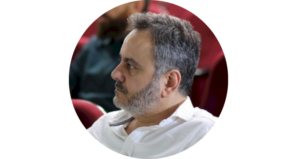
Residency period: March 4th to December 31st, 2024
Department of Information Theory and Management – School of Information Science at UFMG
Maurício Barcellos Almeida is a professor in the Department of Information Theory and Management at the School of Information Science at UFMG. He has a PhD in Information Science (UFMG) with the best thesis award in 2007 from the National Association for Research and Postgraduate Studies in Information Science (ANCIB), Master in Information Science (UFMG), Specialist in Administration (UNA); Specialist in Software Engineering (PUC-MG) and graduated in Civil Engineering (UFMG). He completed postdoctoral studies at the State University of New York (SUNY) and the Faculty of Medicine (UFMG). He works on developing models used by computers to deal with representations of things in the world, that is, the things that people live with on a daily basis such as trees, bacteria, cars, institutions, books, lotteries, governments, other people, their professions, to name a few. These models, called “ontologies”, provide schematics to computers, making them capable of supporting logical inferences, that is, automatic reasoning. Ontologies are formal and rigorous representations of things in the world and the relationships between them. This is the approach of the discipline of Applied Ontology, where the emphasis is on the representation of things themselves and not on the words used to describe such things. Due to their emphasis on representing things, and not the complexity of human language, ontologies are used throughout the world for basic integration between information systems, commonly known as “interoperability”, in various areas and in particular in the medical field. In this context, it acts as a type of translator between humans and machines.
TRANSDISCIPLINARY INTEGRATIONS OF SCIENTIFIC THEORIES FOR USE IN ARTIFICIAL INTELLIGENCE
There is a lot of talk today about Artificial Intelligence (AI), with emphasis on new tools, technologies, and future developments. In the areas of Social Sciences and Humanities there are several studies on ethical and legal issues, as well as on the impacts on society of new algorithms and respective systems. However, little is said about how Social Sciences can participate more directly in this new stage of AI developments. A few years ago, working with AI was something for “knowledge engineers”, professionals highly specialized in technology, logic and computing. In the 21st century, this can now be done in a simpler way, formalizing theories and implementing them in much more user-friendly technologies. An alternative in this sense is the approach called “Applied Ontology”, which combines philosophical foundations and the most recent technologies. The present project is developed in this context. The general objective is to propose formalizations of scientific theories based on the Applied Ontology approach, integrating Social Sciences vocabularies and implementing them in AI tools. To this end, a methodology is adopted which, from a theoretical point of view, uses conceptual analysis, in turn based on categorical analysis to obtain formal theories; and from a practical point of view, it makes use of typical AI artifacts to implement, represent, validate and integrate theories. At least two results are expected: i) improvement in scientific communication within and between scientific fields; ii) obtaining Social Science theories in a format directly applicable to AI digital environments. The expected contribution has a transdisciplinary character necessary for solving complex problems in society.